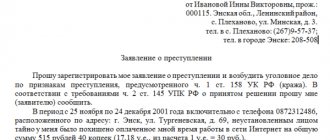New edition of Art. 168 of the Criminal Code of the Russian Federation
Destruction or damage to someone else's property on a large scale, committed through careless handling of fire or other sources of increased danger -
shall be punishable by a fine in the amount of up to one hundred twenty thousand rubles, or in the amount of the wages or other income of the convicted person for a period of up to one year, or by compulsory labor for a term of up to four hundred eighty hours, or by corrective labor for a term of up to two years, or by restriction of freedom for a term of up to one year. years, or forced labor for up to one year, or imprisonment for the same period.
Commentary on Article 168 of the Criminal Code of the Russian Federation
1. Careless destruction or damage to someone else's property causes enormous material damage. Therefore, its criminalization is justified.
2. The elements of a crime from the objective side are expressed in the destruction or damage of someone else’s property, causing material damage on a large scale.
3. For the concept of large size, see paragraph 4 of the note. to Art. 158. This consequence only covers actual damage caused to the owner of the property in an amount exceeding 250 thousand rubles.
3.1. Mandatory in qualifying an act as a crime is the method of causing harm - careless handling of fire or other sources of increased danger.
4. A crime can be committed as a result of both frivolity and negligence (see commentary to Article 26).
5. The subject of a criminal offense is a sane individual who has reached the age of 16 at the time of the commission of the crime.
6. If the destruction or damage to someone else’s property was a consequence of a violation of fire safety rules by a person who had the responsibility to comply with them, then the act is qualified under Art. 219. Also, according to special norms, the negligent infliction of damage to someone else’s property in violation of other rules is qualified (see Articles 215 - 218, 220, 224 - 225, etc.).
7. The acts are classified as crimes of minor gravity.
Commentary to Art. 168 of the Criminal Code of the Russian Federation
1. On the concept of someone else’s property, its destruction and damage, see the commentary to Art. 167.
2. If careless destruction or damage to property occurred not by handling sources of increased danger, but, say, by unintentional flooding by neighbors of an apartment located on the floor below, the act does not constitute a crime under the commented article.
Based on paragraph 1 of Art. 1079 of the Civil Code, activities associated with increased danger to others are the use of vehicles, mechanisms, high-voltage electrical energy, nuclear energy, explosives, potent poisons, etc.; carrying out construction and other related activities, etc. Handling fire in everyday life or, say, when committing another crime, thus does not correspond to the concept of the specified activity, however, the given reference to the civil law cannot limit the scope of the commented norm of the Criminal Code.
For example, among other things, O. was convicted under Art. 168 of the Criminal Code for dousing the victim with gasoline and demonstrating a lighter, from careless handling of which he himself caught fire, and this caused a fire in the house. ——————————— See: Cassation definition. RF Armed Forces dated October 27, 2010 N 10-010-30.
“Careless handling of fire or other sources of increased danger in the sense of Article 168... may, in particular, consist in improper handling of ignition sources near flammable materials, in the operation of technical devices with unrepaired defects (for example, using a tractor in the forest without a spark arrester, leaving without supervision of unextinguished stoves, fires or unswitched electrical appliances, gas burners, etc.)” (clause 11 of the Resolution of the Plenum of the Armed Forces of the Russian Federation dated 06/05/2002 N 14).
Violation of traffic rules while driving a car cannot be regarded as careless handling of a source of increased danger. This act is fully covered by the disposition of Art. 264 of the Criminal Code and additional qualifications under Art. 168 of the Criminal Code does not require. ——————————— Judicial practice of the Supreme Court of the Republic of Karelia in criminal cases for the second half of 2010, paragraph 2 // BVS of the Republic of Karelia. 2011. N 1.
3. In the event that a person sets fire to his own property, resulting in large-scale damage through negligence to someone else’s property or property that was the joint property of other persons and the culprit, the latter’s actions should be qualified as destruction or damage to someone else’s property through negligence ( clause 8 of the Post of the Plenum of the Armed Forces of the Russian Federation dated 06/05/2002 N 14).
4. Destruction or damage to property through negligence (including through careless handling of fire) is one of the crimes against property, liability for which is provided for in Chapter. 21 of the Criminal Code of the Russian Federation. In this regard, when deciding on the amount of destroyed or damaged property, one should be guided by paragraph 4 of the note. to Art. 158 of the Criminal Code (clause 7 of the Post. Plenum of the Armed Forces of the Russian Federation dated 06/05/2002 N 14).
5. The moment of completion of the crime is associated with the emergence of such a state of the damaged object, which can characterize it as destroyed or damaged, and the resulting damage as exceeding 250 thousand rubles. The question of the causal relationship between the actions of the perpetrator and the harm caused, as always happens when qualifying careless crimes, is quite complex. If, for example, the result of careless handling of fire was damage to property in an amount not exceeding 250 thousand rubles, and significantly greater damage was caused by actions to extinguish the fire, then all of these consequences can be imputed to the person as part of the commentary. crimes, if it is established that fire extinguishing was carried out in accordance with the requirements for such activities (taking into account the object, situation, available means, etc.).
6. The subject of the crime - general - is a sane individual who has reached the age of 16 at the time of committing the crime (Part 2 of Article 20 of the Criminal Code of the Russian Federation), based on the fact that the circle of such persons within the meaning of the commented norm is not limited to the owners mentioned in the civil law sources of increased danger.
7. The subjective side of the crime is negligence, which does not manifest itself in relation to such a characteristic of damage as its size (when a person mistakenly assumes that the property on which he deliberately has a destructive, damaging effect will not cause damage in the amount of more than 250 thousand rubles), but to the actual fact of causing damage to property.
8. Causing large damage through negligence may be a sign of another crime, for example, provided for in Art. 267 of the Criminal Code of the Russian Federation. The question of delimiting the relevant compositions arises, since although the mentioned norm deals with targeted actions of destruction, etc. TS, etc. (and this may also occur with the use of fire and other sources of increased danger), in relation to the destruction or damage of other property, the person may still not have intentional guilt. For example, when a person, out of mischief, sets fire to a signaling device, not expecting that the fire will spread to a passing train. In relation to the damage to the burnt composition as a consequence of these actions, the handling of fire was careless. In this case, the qualification of the act is also under Art. 168 of the Criminal Code will be redundant.
9. If, as a result of careless handling of fire or other sources of increased danger, resulting in the destruction or damage of someone else’s property on a large scale, a person’s death occurs, the actions of the perpetrator are qualified under a set of articles providing for liability for causing death by negligence (Article 109 of the Criminal Code of the Russian Federation) and destruction or damage to property due to negligence (Article 168 of the Criminal Code of the Russian Federation) (clause 11 of the Post. Plenum of the Armed Forces of the Russian Federation dated 06/05/2002 N 14).
Another comment on Art. 168 of the Criminal Code of the Russian Federation
1. Some of the signs of this crime coincide with the corresponding signs of Art. 167 of the Criminal Code of the Russian Federation.
2. The objective side of the crime involves the destruction or damage of someone else’s property on a large scale (note 4 to Article 158 of the Criminal Code of the Russian Federation), committed in a special way - through careless handling of fire or other sources of increased danger (clause 11 of the Resolution of the Plenum of the Supreme Court of the Russian Federation dated 5 June 2002 No. 14 “On judicial practice in cases of violation of fire safety rules, destruction or damage to property by arson or as a result of careless handling of fire.”
3. The subjective side is characterized by negligence.
Challenging the debtor's transaction under Articles 10, 168 of the Civil Code of the Russian Federation, which is not included in the period of suspicion
Bankruptcy lawyers are discussing the ruling of the Supreme Court of the Russian Federation dated January 29, 2020 No. 308-ES19-18779(1,2) in case No. A53-38570/2018, which considered the issue of collecting damages from a financial manager for not challenging the debtor’s transactions made before the period of suspicion .
Colleagues note that the Supreme Court concluded that 1) when challenging transactions under Articles 10 and 168 of the Civil Code of the Russian Federation, it is necessary to determine circumstances that allow one to go beyond the disposition of paragraph 2 of Art. 61.2 of the Bankruptcy Law and 2) the financial manager has the right not to challenge transactions on the grounds of Articles 10, 168 of the Civil Code of the Russian Federation that do not go beyond the disposition of clause 2 of Art. 61.2 ZoB and not included in the period of suspicion.
The main thing that is important from the plot of the case is that the transactions for the withdrawal of property were completed in the middle of 2011-2013, and the bankruptcy case was initiated in November 2021.
Transactions of an individual who is not an individual entrepreneur, made before October 1, 2015, can be challenged exclusively under Art. 10, 168 Civil Code of the Russian Federation. In this case, we are talking about transactions that are included in the period of suspicion. In turn, the qualifying criteria for such transactions are identical to the criteria for transactions specified in paragraph 2 of Art. 61.2 ZoB.
In judicial practice, including in the rulings of the Supreme Court, the position has already been firmly established that if at the time of transactions the debtor-individual had the status of an individual entrepreneur, then the transactions can be challenged exclusively on special bankruptcy grounds (for example, the ruling of the Supreme Court of the Russian Federation from 07/22/2019 N 308-ES19-4372 in case N A53-15496/2017).
In the case under consideration, the debtor at the time of the transactions was an individual entrepreneur, about which the Supreme Court makes a special reservation. This would matter if the transactions entered into a period of suspicion. Then they should be challenged under paragraph 2 of Art. 61.2. But the transactions were made during a period of suspicion, and therefore challenge was possible only on the basis of Articles 10 and 168 of the Civil Code of the Russian Federation.
In the ruling under consideration, the Supreme Court does not provide explanations on this matter, but states the following:
“Since the controversial transactions were carried out by A.I. Krymov from 2011 to April 2013, that is, outside the three-year period of suspicion, they had no prospects for a judicial challenge under Chapter III.1 of the Bankruptcy Law, since it was highly likely that legal action would follow refusal to satisfy the stated demands.”
In turn, the creditor, realizing the futility of challenging under clause 2 of Art. 61.2 ZoB, required the financial manager to challenge the transactions precisely on the basis of Articles 10, 168 of the Civil Code of the Russian Federation.
But regarding the prospects for such a challenge, the Supreme Court points out the following:
“To qualify a transaction as void under Articles 10 and 168 of the Civil Code of the Russian Federation, it was necessary to identify violations that went beyond the disposition of Part 2 of Article 61.2 of the Bankruptcy Law.”
And then he continues:
“... alienation by Krymov A.I. of their property at a reduced price in favor of interested parties (relatives) in anticipation of the deadline for repayment of loans with the aim of causing harm to creditors was sufficient grounds for challenging transactions according to the general rules on the invalidity of transactions made with abuse of law. However, the arbitration manager quite correctly proceeded from the fact that those named by V.A. Popov. the circumstances do not go beyond the scope of Article 61.2 of the Bankruptcy Law, and no other circumstances were seen. Consequently, there are no judicial prospects for challenging the transactions of A.I. Krymov. in the case of his bankruptcy under Articles 10 and 168 of the Civil Code of the Russian Federation it was not the same.”
Thus, the Supreme Court says that if the transaction, although it has all the defects of the transaction specified in paragraph 2 of Art. 61.2 ZoB, but committed during a period of suspicion, it is impossible to challenge it on the basis of Articles 10, 168 of the Civil Code of the Russian Federation.
The Supreme Court once again repeats the need for circumstances to go beyond the disposition of paragraph 2 of Art. 61.2 of the Bankruptcy Law for challenging transactions under Articles 10, 168 of the Civil Code of the Russian Federation, but does not provide examples of such circumstances.
Responsibility measures
For careless actions, improper handling of sources of increased danger, such as fire, which subsequently led to the destruction of someone else's property or its damage on a large scale, Article 168 of the Criminal Code of Russia provides for the following preventive measures:
- penalties – up to 120 thousand rubles. or the annual income of the convicted person;
- correctional labor – up to two years;
- compulsory work – up to 480 hours;
- forced labor – up to one year;
- restriction of freedom – up to one year;
- complete imprisonment - up to one year.
The final determination is made by the judicial authority based on the results of the investigation.
Important! It must be borne in mind that the subject of the criminal act we are considering can only be a mentally healthy person who has already reached the age of sixteen at the time of the commission of the offense.
So teenagers under this age will be able to avoid punishment under this article.
Proof
Since Art. 168 of the Criminal Code of the Russian Federation implies that the offender did not have any intent, then it is necessary to begin to prove the unpremeditation of this criminal act precisely by confirming the absence of this intent on the part of the perpetrator. This is sometimes quite difficult to do.
Important! Testimony from eyewitnesses of the incident, if any, and expert opinions from the fire scene can help.
The very fact of the presence of violations in the operation of sources of increased danger is established during the relevant examinations - chemical, electrical, fire-technical and others.
Examples
We have dealt with the differences from related criminal groups. Now let's look at judicial practice. Let's take two examples of such irresponsible acts that caused damage or destruction of someone else's property.
Example 1
The Supreme Court of Tatarstan considered an appeal in a case of damage to someone else's property. The situation itself was as follows: the plaintiff left his car in the parking lot next to the house next to the defendant’s car. And at night there was a fire and both vehicles burned down.
Experts, after examining the defendant’s car, were unable to establish his guilt under Article 168, since his car was not in a state of disrepair. Consequently, the court could not hold the defendant accountable under the article we mentioned above.
As a result, the defendant was assigned a fine under Article 1064 of the Civil Code of the Russian Federation, which he had to pay to the plaintiff. This article of the Civil Code says that a citizen who causes damage to the property of another citizen is obliged to compensate for this damage.
In this case, lack of evidence does not become an obstacle, since the defendant must prove his innocence in the incident on his own . But he could not do this.
Example 2
The Ulyanovsk City Court heard a case involving a fire in a residential building that occurred as a result of welding work carried out in it by the defendant. He failed to take appropriate security measures in a timely manner.
The result of violation of fire safety rules and operation of welding equipment was a fire. The losses suffered by the plaintiff as a result of this fire were estimated at more than one million rubles.
But the defendant admitted his guilt, which somewhat lightened his sentence . In addition, there were two more circumstances mitigating his guilt. He had never been convicted before this incident, and he had a young child. The court ordered the unlucky welder to perform 200 hours of compulsory work.
Corpus delicti
Let us consider in detail the composition of this criminal act.
According to the article we discussed above, the object here is one of the forms of ownership. The object side will be damage or complete destruction of other people's property , which was the result of careless handling of fire or any sources that pose a high level of danger.
The objective side is the destruction or damage of any items of someone else’s property, when the consequences that occurred were the result of careless handling of fire or some other sources of increased danger.
The subject will be property that can belong to either an individual or an organization.
Important! The property itself must necessarily be of some material value, and the damage caused must be quite significant.
The side of the subject of this criminal act lies precisely in carelessness, frivolity and negligence (shortsightedness, inattention). The subject of the crime, as in most criminal offenses, will be a sane person who has reached the age of sixteen.
Main differences from related crimes
There are two more types of acts that are very similar to the crime we are considering. But responsibility for them comes under other articles of the Criminal Code. Let's list them below:
- Careless handling of military supplies or other types of military weapons . Such actions are considered under Article 347 of the Criminal Code of the Russian Federation.
- Damaging or destroying someone's property, but with intent . Responsibility for such an act is provided for in Article 167 of the Criminal Code of the Russian Federation.








